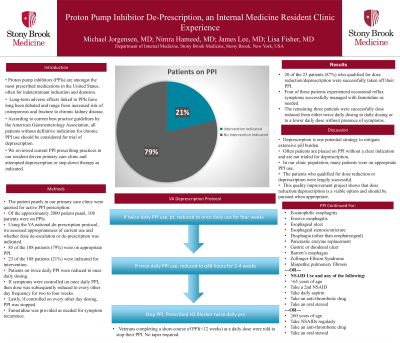Monday Poster Session
Category: Esophagus
P2199 - Proton Pump Inhibitor Deprescription, an Internal Medicine Resident Clinic Experience
Monday, October 28, 2024
10:30 AM - 4:00 PM ET
Location: Exhibit Hall E

Has Audio

Michael Jorgensen, MD
Stony Brook Medicine
Stony Brook, NY
Presenting Author(s)
Michael Jorgensen, MD, Nimra Hameed, MD, James Lee, MD, Lisa Fisher, MD
Stony Brook Medicine, Stony Brook, NY
Introduction: Proton pump inhibitors (PPIs) are amongst the most prescribed medications in the United States, often for indeterminant indication and duration. Long-term adverse effects linked to PPIs have long been debated and range from increased risk of osteoporosis and fracture to chronic kidney disease. According to current best practice guidelines by the American Gastroenterology Association, all patients without definitive indication for chronic PPI use should be considered for trial of deprescription. We reviewed current PPI prescribing practices in our resident driven primary care clinic and attempted deprescription or step-down therapy as indicated.
Methods: The patient panels in our primary care clinic were queried for active PPI prescription. Of the approximately 2000 patient panel, 108 patients were on PPIs. Using the VA national deprescription protocol, we assessed appropriateness of current use and whether dose de-escalation or deprescription was indicated. 85 of the 108 patients (79%) were on appropriate PPI. 23 of the 108 patients (21%) were indicated for intervention. Patients on twice daily PPI were reduced to once daily dosing. If symptoms were controlled on once daily PPI, then dose was subsequently reduced to every other day frequency for two to four weeks. Lastly, if controlled on every other day dosing, PPI was stopped. Famotidine was provided as needed for symptom recurrence.
Results: 20 of the 23 patients (87%) who qualified for dose reduction/deprescription were successfully taken off their PPI. Four of these patients experienced occasional reflux symptoms successfully managed with famotidine as needed. The remaining three patients were successfully dose reduced from either twice daily dosing to daily dosing or to a lower daily dose without presence of symptoms.
Discussion: Deprescription is one potential strategy to mitigate extensive pill burden. Often patients are placed on PPI without a clear indication and are not trialed for deprescription. In our clinic population, many patients were on appropriate PPI use. The patients who qualified for dose reduction or deprescription were largely successful. This quality improvement project shows that dose reduction/deprescription is a viable option and should be pursued when appropriate.
Disclosures:
Michael Jorgensen, MD, Nimra Hameed, MD, James Lee, MD, Lisa Fisher, MD. P2199 - Proton Pump Inhibitor Deprescription, an Internal Medicine Resident Clinic Experience, ACG 2024 Annual Scientific Meeting Abstracts. Philadelphia, PA: American College of Gastroenterology.
Stony Brook Medicine, Stony Brook, NY
Introduction: Proton pump inhibitors (PPIs) are amongst the most prescribed medications in the United States, often for indeterminant indication and duration. Long-term adverse effects linked to PPIs have long been debated and range from increased risk of osteoporosis and fracture to chronic kidney disease. According to current best practice guidelines by the American Gastroenterology Association, all patients without definitive indication for chronic PPI use should be considered for trial of deprescription. We reviewed current PPI prescribing practices in our resident driven primary care clinic and attempted deprescription or step-down therapy as indicated.
Methods: The patient panels in our primary care clinic were queried for active PPI prescription. Of the approximately 2000 patient panel, 108 patients were on PPIs. Using the VA national deprescription protocol, we assessed appropriateness of current use and whether dose de-escalation or deprescription was indicated. 85 of the 108 patients (79%) were on appropriate PPI. 23 of the 108 patients (21%) were indicated for intervention. Patients on twice daily PPI were reduced to once daily dosing. If symptoms were controlled on once daily PPI, then dose was subsequently reduced to every other day frequency for two to four weeks. Lastly, if controlled on every other day dosing, PPI was stopped. Famotidine was provided as needed for symptom recurrence.
Results: 20 of the 23 patients (87%) who qualified for dose reduction/deprescription were successfully taken off their PPI. Four of these patients experienced occasional reflux symptoms successfully managed with famotidine as needed. The remaining three patients were successfully dose reduced from either twice daily dosing to daily dosing or to a lower daily dose without presence of symptoms.
Discussion: Deprescription is one potential strategy to mitigate extensive pill burden. Often patients are placed on PPI without a clear indication and are not trialed for deprescription. In our clinic population, many patients were on appropriate PPI use. The patients who qualified for dose reduction or deprescription were largely successful. This quality improvement project shows that dose reduction/deprescription is a viable option and should be pursued when appropriate.
Disclosures:
Michael Jorgensen indicated no relevant financial relationships.
Nimra Hameed indicated no relevant financial relationships.
James Lee indicated no relevant financial relationships.
Lisa Fisher indicated no relevant financial relationships.
Michael Jorgensen, MD, Nimra Hameed, MD, James Lee, MD, Lisa Fisher, MD. P2199 - Proton Pump Inhibitor Deprescription, an Internal Medicine Resident Clinic Experience, ACG 2024 Annual Scientific Meeting Abstracts. Philadelphia, PA: American College of Gastroenterology.
